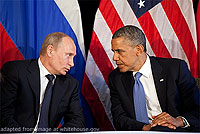Reset the Reset: Can Russia’s Putin Make Peace With Obama II?

(Voice of America – James Brooke – November 12, 2012 – James Brooke is VOA Moscow bureau chief, covering Russia and the former USSR)
The reset jet no longer flies to Moscow.
In March of 2009, Russian Foreign Minister Sergei Lavrov and Hillary Clinton, then a brand new secretary of state, jointly pushed a “reset” button, signaling an end to the acrimony of the George W. Bush years. In that same month, United Airlines inaugurated direct jet service between Washington and Moscow.
A few weeks ago, United quietly suspended the Washington-Moscow flight.
International air passenger traffic out of Moscow is up 19 percent this year. But traffic to Washington is soft.
President Putin may drum up a little business with his invitation last week to President Obama to visit Moscow in 2013.
But to use 1980s Cold War vocabulary familiar to Russia’s rulers, let’s see how far the Kremlin’s détente lasts with the second Obama Administration.
This week, the U.S. Congress is set to debate the Magnitsky Act. Tied to a bill granting permanent normal trade relations to Russia, this legislation allows Washington to impose banking and visa restrictions on foreign officials seen as guilty of human rights abuses.
Russia sees this bill as being aimed at Russians, and has already announced that it will take retaliatory measures. So the Russian-American détente may last until Christmas.
On the Kremlin side, President Putin needs an enemy to rally his blue collar, small city, less educated supporters. The United States is a convenient “enemy” because, from the Kremlin’s viewpoint, the U.S. ‘threat’ is manageable.
Unlike a certain Asian country with 10 times Russia’s population, the United States does not share a long land border with Russia. The U.S.-Russia border is water, ice, and lightly populated by Eskimos.
One generation after the collapse of the Soviet Union, trade between Russia and the U.S. is so anemic that the Kremlin feels it can afford to give Washington a few verbal kicks. On the trade side, 40 percent of Russia’s imports come from Europe, 16 percent from China, and only 4.5 percent from faraway USA.
For the Cold War generation, now ruling Russia, the U.S. is easy to see as a threat, or, at least, as a rival.
Fifty years ago, Nikita Khrushchev did not pound his shoe on a desk, and exhort his Soviet countrymen “We must catch up with…the French.”
Since then, the reality on the ground has changed. But nearly half a century of Cold War rivalry has a psychological momentum that continues into the 21st century in the brains of many Russians.
But, it is an unrequited enmity. On the American side, Americans are obsessed not with Russia but with the rise of China, and how to react to it.
I once interviewed Fernando Henrique Cardoso, the Brazilian sociologist who was launching his ultimately successful candidacy for the presidency of Brazil. Looking back at Brazil’s “lost decade” of the 1990s hyperinflation and low growth he said the biggest threat to Brazil was “irrelevancia.”
Russia, with its massive nuclear arsenal, will never be irrelevant on the international stage.
But to many Americans, Russia too often gets attention for the wrong reason for playing the spoiler, for kicking Washington in the shins.
On Syria, the world looked last July to the Kremlin as the only outside power that could broker a deal to end the civil war and to ease Bashar al-Assad into a golden exile. But instead of playing a constructive role, the Kremlin, as the Brazilians would say, stepped on the ball.
More constructive is the Kremlin’s recent acceptance and advocacy of the idea that the United States and Iran talk directly about Iran’s nuclear weapons program. Creative thinking goes like this: if Nixon could go to China, maybe Obama, in his second term, can go to Tehran.
But, in general, official Washington remains wary of Putin’s Russia. While most of the anti-American propaganda here is for domestic consumption, Russian officials seem to forget that what is said here eventually makes it back to Washington.
If Russia’s state-controlled media harasses and vilifies U.S. Ambassador Michael McFaul, the Kremlin should not forget that he worked for three years inside the Obama White House, was unanimously approved by the U.S. Senate, and maintains a direct line to the man who will be President of the United States through 2016. Guess who will walk with President Obama into the room for a meeting with President Putin?
While I spent the U.S. election period in Moscow, my friend and fellow columnizer, Konstantin von Eggert, spent the election time in Washington. In his latest Due West column, this Russian columnist for Ria Novosti writes of American attitudes:
“‘Let the Russians do their own thing as long as they do not become too much of a nuisance,’ seems to be the prevailing view in the White House. Once adopted, it is hard to change. As long as the Kremlin makes sure it does not do anything that is spectacularly offensive to America’s sensitivities, this policy is bound to last.”
President Putin’s invitation to President Obama is a positive step forward.
But Obama is just as pragmatic a politician as is Putin.
In his second term, Obama may have more flexibility, but he wants concrete results. The essence of a transactional relationship is to do deals. Obama’s job is not to lead group therapy for Russian officials bitter over perceived American slights that took place when he was in law school.
If Obama sees that Moscow’s polemics and posturing are going to bog down the Russian-American deal making, he will redirect his time and attention elsewhere.
The American voters have reset the Obama presidential clock for four more years.
Now let’s see if Moscow and Washington can reset the reset.
